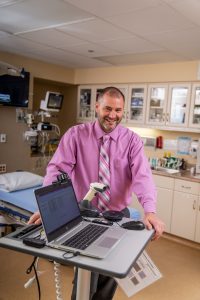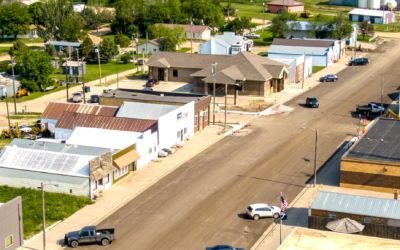Rural Douglas County Healthcare System Confronts COVID Head-On
Rural healthcare providers face challenges, but that isolation can be beneficial, too. When COVID-19 arrived in South Dakota, it took a while for cases to reach rural areas. That gave Douglas County Memorial Hospital (DCMH) in Armour a little time to prepare for the onslaught.
Built in 1957, DCMH serves around 3,000 residents in both Douglas and Charles Mix Counties. Thanks to a proactive approach and modern technology, the facility was well-equipped to treat rural patients once the pandemic arrived.

Heath Brouwer, Douglas County Memorial Hospital
Pandemic Poses New Challenges
When COVID-19 began spreading across the country, healthcare facilities nationwide struggled to get a handle on a threat few had previously encountered. Though DCMH’s rural setting bought them some time, there was no doubt they’d feel its impacts before long.
“Once that first case was diagnosed in South Dakota, we came to the conclusion that eventually this was going to hit us,” explains CEO Heath Brouwer. “It took a little while, but when it did, we saw a pretty significant increase in patients we needed to care for.”
Even with advance preparation, DCMH was not immune to the challenges other facilities encountered. Shortages of personal protective equipment (PPE) and testing supplies, and mental stress on the staff, took their toll.
“We’re dealing with a pandemic that we’ve never dealt with before, something new,” Heath recalls. “And we are an independent hospital, so we’re trying to figure this out on our own, as well.”
Telemedicine Benefits Patients & Clinic
DMCH did have a leg up in one important area. Strong fiber optic connections supplied by Golden West allowed them to promote and expand their telemedicine program, giving individuals the opportunity to schedule virtual appointments. Staff used iPads to communicate with patients, who could visit with their physicians over a computer or phone.
Both the hospital and patients benefited from this arrangement. DCMH had fewer people in the clinic, reducing the odds of spreading COVID-19, and patients — especially those who were high risk — were able to stay home and avoid subjecting themselves to outside conditions that might jeopardize their health.
“Having high-speed internet and fiber helped ensure we didn’t have any delays in patient care,” Heath says. “Instead of having to send those patients to Sioux Falls or somewhere else, they were able to stay close to home. They could talk with their physician without having to leave Douglas County. Without the high-speed internet, that would not have been possible.”
Another proactive step involved converting four rooms in the clinic to negative pressure rooms, which isolated patients and helped prevent COVID-19 from spreading. Other approaches included instituting temperature checks, requiring face masks, and limiting visitors.
Strategy Evolves as Supplies Improve
As the pandemic wore on and supplies became more readily available, DCMH was able to provide even better patient care. Having PPE on hand helped, but Heath says the biggest improvement was getting supplies for the lab to do in-house COVID testing. Initially, the shortage of testing kits forced them to send tests to an outside state lab for processing. Results took 24 to 48 hours — an eternity for patients in limbo. Suddenly, those same results were available in a matter of minutes.
“We could tell an individual in 15 minutes whether they were positive or negative and could handle their health care in the appropriate fashion,” he says. “That changed things tremendously. It’s something you want to know and deal with at the time.”
Being on the frontlines and dealing with a previously unknown health threat took a toll on the staff at DCMH, but Heath is proud of their hard work and believes his team rose to the challenge.
“There was a pretty high level of anxiety and stress that the staff had to endure, but we went through it as a team, and I think we’re a better facility because of it,” he says. “We kept our community as safe as possible, and the staff rose to the challenge. It definitely brought us closer together!”



